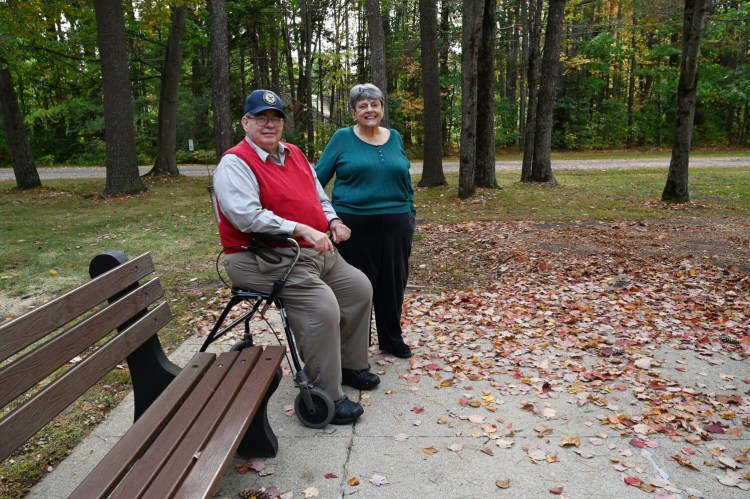Ron Menard was drawn to volunteer at the Maine Veterans Home in Scarborough two years ago.
“I’ve been really blessed in my life, and I knew I was ready to give something back,” said Menard, 74, who lives in South Portland.
He didn’t know the long-term care and skilled rehabilitation facility would come to mean so much to him, especially in recent months when COVID-19 killed 14 residents in one of the state’s earliest and largest outbreaks. Nor could he have predicted that he would get a patient’s perspective of living at the home during a pandemic lockdown.
Menard, a retired business consultant who served 21 years in the Navy and Naval Reserve, first got involved at the home through Vet to Vet Maine, a nonprofit agency that pairs veterans for mutual support. Soon he was delivering Holy Communion to Catholic residents and patients at the Route 1 facility.
Menard got to know the veterans who attended the monthly prayer services he led, scheduled through St. Maximilian Kolbe Church in Scarborough. His wife, Mary, often baked cookies to serve with coffee. They shared family photos. They became friends.
When nursing homes across Maine closed to visitors and volunteers in March, Menard’s role as a Eucharistic minister was put on hold, and he was cut off from the veterans he had grown to love. As the death toll rose through April, Menard was beside himself with worry.
“I was concerned about everyone there and the people I ministered to,” Menard recalled. “I prayed for every one of them, but I couldn’t find out anything. It was nerve-racking not to know.”
Then in August, Menard had knee replacement surgery, which had been postponed in March. Afterward, he spent several days at Mercy Hospital and needed to spend some time in rehab before returning home.
His wife had been a rehab patient at the veterans home following hip replacement surgery in 2018. Wives and widows of veterans are eligible for care at Maine Veterans Homes in Scarborough, Augusta, Bangor, Caribou, Machias and South Paris.
“It was just extraordinary how they treated her and how well she recovered,” Menard said.
Menard knew the Scarborough facility hadn’t been admitting patients because of the pandemic, but his wife called to make sure. They learned the home was about to resume admissions under strict health and safety protocols to prevent another outbreak.
“I was the first admission to the home after the shutdown,” Menard said. “They were observing strict protocols. They looked like they were wearing space suits all the time. But they were fantastic. They were so kind. It was like room service.”
Staff at the home downplayed the risk to their own health, Menard said.
“They said it was their role,” he said. “They were living and working with the threat of the virus every day. I admire them for that.”
Menard’s wife and other family members visited regularly – standing outside the window to his room in the single-story facility. They have six children and 11 grandchildren.
“They put my name in the window so visitors could find me,” he said. “Mary would come by, and we’d talk to each other on our cell phones. We joked that it was like visiting me in prison.”
His wife brought him some clothes one day and left them at the front desk. They had to be sanitized for two days in case they carried the virus or other germs. “They were sanitizing everything all the time,” Menard said.
Those health and safety precautions have paid off.
The Maine Center for Disease Control and Prevention declared the outbreak at the home was over on June 16 and as of Nov. 3 it had been free of COVID-19 for 188 days, said spokesman Josh Scroggins.
During the summer, the home resumed in-person visits outdoors under social distancing protocols. It would resume regular indoor visits and volunteer services according to state and federal CDC guidelines, but that hadn’t happened yet, Scroggins said.
And the home re-established the honor guard that pays final tribute to veterans by escorting deceased residents from the long-term care unit, Scroggins said.
Menard also hopes to resume his Eucharistic ministry soon. He’s waiting for the OK from the home, the church and his doctor. He still doesn’t know if some of the veterans who attended his prayer services were taken by the virus.
He understands privacy requirements, but he’d really like to know.
“Some I only knew by their first names,” Menard said. “They are all in my prayers, even now.”
Comments are not available on this story.
Send questions/comments to the editors.



